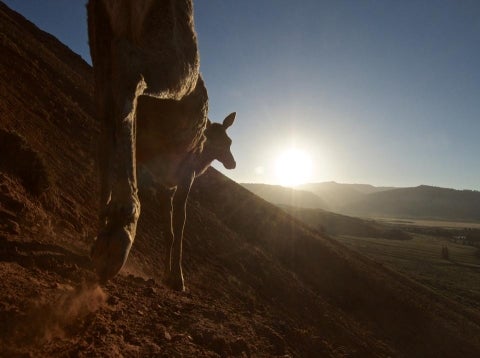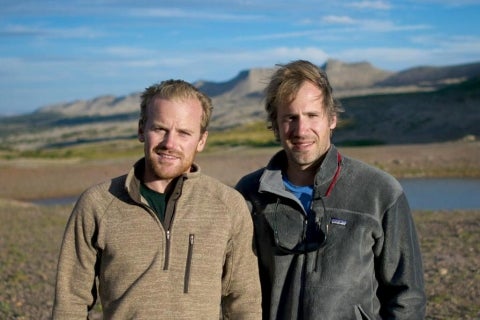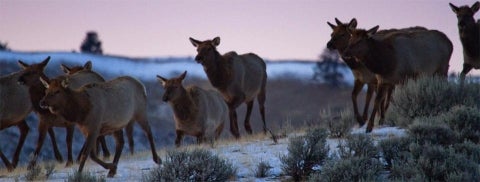Note: Yale School of the Environment (YSE) was formerly known as the Yale School of Forestry & Environmental Studies (F&ES). News articles and events posted prior to July 1, 2020 refer to the School's name at that time.

Arthur Middleton M.E.M. ’07, who has spent six years exploring how ecological changes in the Greater Yellowstone Ecosystem are affecting the region’s migratory elk herds, has received a $100,000 research prize for his ongoing efforts to monitor and conserve the iconic species.
On Sept. 19, Middleton, a Donnelley Postdoctoral Fellow at the Yale Institute for Biospheric Studies, and wildlife photographer Joe Riis will be presented with the first Camp Monaco Prize, a scientific prize that supports biodiversity research and outreach in Yellowstone.
The prize money will help support a two-year campaign to document the movements of Yellowstone’s five herds of migratory elk, an animal whose seasonal abundance is the lifeblood of the Greater Yellowstone Ecosystem and that carries economic and cultural importance in the region. But as Middleton’s earlier research has shown, the animals are also facing a series of ecological changes that could reshape their migrations, from increased populations of their primary predators, wolves and bears, to increasingly dry conditions that have altered the diets of much of Yellowstone’s wildlife.
In addition to publishing their results, Middleton and Riis will utilize a network of camera traps to monitor the health of the herds, produce an online tracking site to display elk migrations in real time, and produce a documentary film. Much of their work will focus on the Cody elk herd, which ranges between the South Fork of the Shoshone River and southeastern Yellowstone National Park.
On Sept. 19, Middleton, a Donnelley Postdoctoral Fellow at the Yale Institute for Biospheric Studies, and wildlife photographer Joe Riis will be presented with the first Camp Monaco Prize, a scientific prize that supports biodiversity research and outreach in Yellowstone.
The prize money will help support a two-year campaign to document the movements of Yellowstone’s five herds of migratory elk, an animal whose seasonal abundance is the lifeblood of the Greater Yellowstone Ecosystem and that carries economic and cultural importance in the region. But as Middleton’s earlier research has shown, the animals are also facing a series of ecological changes that could reshape their migrations, from increased populations of their primary predators, wolves and bears, to increasingly dry conditions that have altered the diets of much of Yellowstone’s wildlife.
In addition to publishing their results, Middleton and Riis will utilize a network of camera traps to monitor the health of the herds, produce an online tracking site to display elk migrations in real time, and produce a documentary film. Much of their work will focus on the Cody elk herd, which ranges between the South Fork of the Shoshone River and southeastern Yellowstone National Park.
 Joe Riis (left) and Arthur Middleton (right).
Joe Riis (left) and Arthur Middleton (right).
Middleton hopes to provide new insights into elk migration paths, the health of the herds, and the potential effects of climate change on the herds — and whether all these changes are making them more vulnerable to predators.
“There is a suite of changes occurring,” he says. “Some have had greater impacts than others, and some we understand better than the others. But it’s high time that we marshal all the available information across the system so we can understand the degree of change and relative importance of each of these changes.
“We also need to go beyond the traditional research approach and provide people with the story of these migrations and why they are important,” he said.
The research will be conducted with numerous regional partners, including the Wyoming Game & Fish Department; Montana Fish, Wildlife & Parks; the U.S. National Park Service; the U.S. Fish and Wildlife Service; and the University of Wyoming.
The project will receive additional support from the George B. Storer Foundation and the Knobloch Family Foundation.
“One of the compelling aspects of this project is that it attempts to bring scientists, government agencies, policy-makers, and the general public together around a topic that cuts across ecology, economy, and culture,” said C.R. Preston, the founding curator of the Buffalo Bill Center of the West’s Draper Natural History Museum and a member of the prize jury.
“This approach holds real hope for effective biodiversity conservation in the 21st century.”
The Camp Monaco Prize is awarded by a partnership between the Draper Natural History Museum, the University of Wyoming’s Biodiversity Institute, and the Prince Albert II of Monaco Foundation-USA.
It is named for a hunting trip coordinated a century ago by Prince Albert I of Monaco and William “Buffalo Bill” Cody. Prince Albert II, who is visiting the Yellowstone region this week to commemorate his grandfather’s expedition, will present the prize to Middleton and Riis.
“There is a suite of changes occurring,” he says. “Some have had greater impacts than others, and some we understand better than the others. But it’s high time that we marshal all the available information across the system so we can understand the degree of change and relative importance of each of these changes.
“We also need to go beyond the traditional research approach and provide people with the story of these migrations and why they are important,” he said.
The research will be conducted with numerous regional partners, including the Wyoming Game & Fish Department; Montana Fish, Wildlife & Parks; the U.S. National Park Service; the U.S. Fish and Wildlife Service; and the University of Wyoming.
The project will receive additional support from the George B. Storer Foundation and the Knobloch Family Foundation.
“One of the compelling aspects of this project is that it attempts to bring scientists, government agencies, policy-makers, and the general public together around a topic that cuts across ecology, economy, and culture,” said C.R. Preston, the founding curator of the Buffalo Bill Center of the West’s Draper Natural History Museum and a member of the prize jury.
“This approach holds real hope for effective biodiversity conservation in the 21st century.”
The Camp Monaco Prize is awarded by a partnership between the Draper Natural History Museum, the University of Wyoming’s Biodiversity Institute, and the Prince Albert II of Monaco Foundation-USA.
It is named for a hunting trip coordinated a century ago by Prince Albert I of Monaco and William “Buffalo Bill” Cody. Prince Albert II, who is visiting the Yellowstone region this week to commemorate his grandfather’s expedition, will present the prize to Middleton and Riis.
– Kevin Dennehy kevin.dennehy@yale.edu 203 436-4842

Published
September 19, 2013